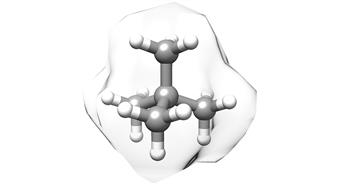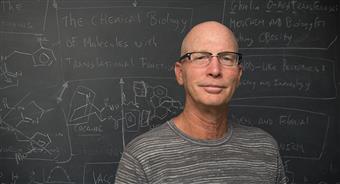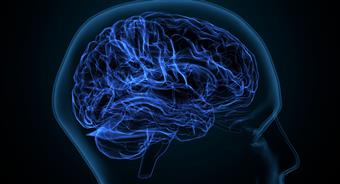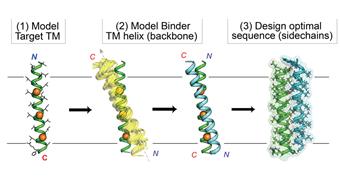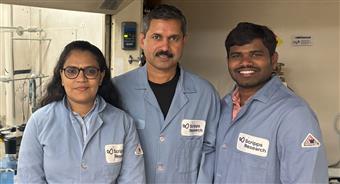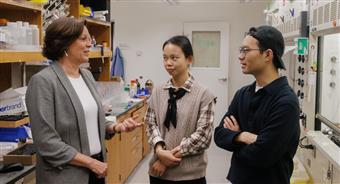
Re-energizing mitochondria to treat Alzheimer's disease Scripps Research team restored neuron-to-neuron connections in human cells.
January 25, 2024
LA JOLLA, CA Nerve cells in the brain demand an enormous amount of energy to survive and maintain their connections for communicating with other nerve cells. In Alzheimer's disease, the ability to make energy is compromised, and the connections between nerve cells (called synapses) eventually come apart and wither, causing new memories to fade and fail.
A Scripps Research team, reporting in the journal Advanced Science on January 18, 2024, has now identified the energetic reactions in brain cells that malfunction and lead to neurodegeneration. By using a small molecule to address the malfunction, which occurred in the mitochondria the cell's major energy producers the researchers showed that many neuron-to-neuron connections were successfully restored in nerve cell models derived from human Alzheimer's patient stem cells. These findings highlight that improving mitochondrial metabolism could be a promising therapeutic target for Alzheimer's and related disorders.
We thought that if we could repair metabolic activity in the mitochondria, maybe we could salvage the energy production, says senior author Stuart Lipton, MD, PhD, Step Family Foundation Endowed Professor and Co-Director of the Neurodegeneration New Medicines Center at Scripps Research, and a clinical neurologist in La Jolla, Calif. In using human neurons derived from people with Alzheimer's, protecting the energy levels was sufficient to rescue a large number of neuronal connections.
In the new study, Lipton and his team found a block in the enzymes that make energy due to an abnormal tag of nitrogen (N) and oxygen (O) atoms onto a sulfur (S) atom, all together forming a dysfunctional SNO enzyme. This reaction is termed S-nitrosylation, and the team demonstrated that a virtual SNO-Storm of these reactions occurred in the Alzheimer's brain neurons.
Lipton and his colleagues initially made the discovery of the SNO-tag on energy enzymes by comparing human brains (obtained at autopsy from people with Alzheimer's disease) to those with no brain disease. The researchers subsequently generated nerve cells from stem cells derived from skin biopsies of people with and without a genetic mutation that causes Alzheimer's disease. Then, using a series of metabolic labels and an oxygen-measuring apparatus, they calculated cellular energy production and identified unique deficits in the Alzheimer's nerve cells compared to controls.
The researchers found the neurons had a disrupted Krebs cycle the cellular process in mitochondria that produces most of the body's crucial molecular power source, ATP. The team pinpointed a bottleneck (or block) in the step where a key molecule is formed: succinate, which drives much of the subsequent production of ATP. In the study, the bottleneck inhibited the mitochondria's ability to produce the energy needed to sustain neurons and their numerous connections.
The researchers hypothesized that if they could supply some of the missing succinate molecules, they might be able to restore energy production essentially jumpstarting the stalled mitochondrial Krebs cycle. Since succinate does not easily travel in or out of cells, they used an analog that could better pass through nerve cell membranes. The strategy worked, repairing up to three quarters of the synapses that had been lost, while preventing further decline.
Succinate is not a compound that people can now take as a treatment, but it's proof-of-principle that you can re-energize the Krebs cycle, says Lipton. The beauty of the study is that we were able to show this in living nerve cells derived from Alzheimer's patients, but we still have to come up with a much better compound in order to develop an effective drug for humans to take.
Lipton has a history of developing FDA-approved drugs for Alzheimer's disease, such as Namenda , and acknowledges that much more work is needed here to produce an additional energy-preserving drug that is both safe and effective in humans. His lab will continue to pursue the mitochondrial Krebs cycle as a promising therapeutic target in the hopes they can restore neuronal connectivity in patients with Alzheimer's, thereby stopping disease progression and enhancing cognitive function.
In addition to Lipton, authors of the study, Metabolic Bypass Rescues Aberrant S-Nitrosylation-Induced TCA Cycle Inhibition and Synapse Loss in Alzheimer's Disease Human Neurons, include Alexander Andreyev, Nima Dolatabadi, Xu Zhang, Melissa Luevanos, Mayra Blanco, Christine Baal, Ivan Putra, and Tomohiro Nakamura of Scripps Research; Hongmei Yang and Steven Tannenbaum of MIT; and Paschalis-Thomas Doulias and Harry Ischiropoulos of the Perelman School of Medicine at the University of Pennsylvania.
This work was supported in part by funding from the National Institutes of Health (R01 AG061845, R61 NS122098, RF1 NS123298, R35 AG071734, RF1 AG057409, R56 AG065372, R01 DA048882, DP1 DA041722, and R01 AG056259).
Neuroscience Lipton, Stuart
More from Scripps
20/04/2024
New copper-catalyzed C-H activation strategy from Scripps Research Two-mode reactions inspired by human detox enzymes offer powerful new tools for drug discover...
12/04/2024
Scripps Research chemists devise easier new method for making a common type of building block for drugs Scientists transform simple linear amines into saturated...
06/04/2024
A simple, inexpensive way to make carbon atoms bind together A Scripps Research team uncovers a cost-effective method for producing quaternary carbon molecules,...
04/04/2024
Developing a vaccine for the zombie drug xylazine Scripps Research chemical biologists design an early proof-of-concept vaccine that could lead to the first...
30/03/2024
How blocking a neural receptor responsible for addiction could reduce alcohol use A Scripps Research team found that a new therapeutic that targets the kappa op...
13/03/2024
New computational strategy boosts the ability of drug designers to target proteins inside the membrane Customized-design approach could streamline the design of...
29/02/2024
Scripps Research scientists reveal how first cells could have formed on Earth New phospholipid discovery brings researchers closer to understanding how primordi...
29/02/2024
How molecular handedness emerged in early biology Scripps Research chemists fill a major gap in origin-of-life theories.
February 28, 2024
LA JOLLA, CA Mole...
22/02/2024
Snaking toward a universal antivenom Scripps Research scientists discovered antibodies that protect against a host of lethal snake venoms.
February 21, 2024
...
06/02/2024
Calibr-Skaggs announces expansion of option and license agreement with AbbVie to develop novel cell therapies for solid tumors and autoimmune diseases
AbbVie...
26/01/2024
Re-energizing mitochondria to treat Alzheimer's disease Scripps Research team restored neuron-to-neuron connections in human cells.
January 25, 2024
LA JO...
24/01/2024
100 years of Science Changing Life: Scripps Research celebrates a century of transforming human health For the last century, institute leaders and renowned scie...
23/01/2024
New technology lets researchers track brain cells' off switches The method could shed light on what goes awry in numerous brain conditions when neurons ar...
09/01/2024
Three decades of giving: Announcing the Calibr-Skaggs Institute for Innovative Medicines The ALSAM Foundation, founded by the Skaggs family, provides lasting g...
04/01/2024
Life science entrepreneur Gene Lay joins Scripps Research Board of Directors Lay, founder of the global biotech company BioLegend, brings invaluable experience ...
21/12/2023
Taming a plant-derived toxin Scripps Research team modifies the traditional poison picrotoxinin for potential neurological drugs and anti-parasite treatments. ...
19/12/2023
Scripps Research Executive Vice President Eric Topol gives TED talk on transformative power of AI in medicine Topol provides an overview of how AI models can i...
13/12/2023
New AI-powered algorithm could better assess people's risk of common heart condition Early detection of atrial fibrillation can reduce the risk of stroke an...
07/12/2023
Nanoparticle flu vaccine design shows promise in early tests Scripps Research-designed vaccine could provide broad, enduring protection against influenza A str...
16/11/2023
Numerous Scripps Research scientists named Highly Cited Researchers Clarivate's annual, global list represents researchers who have demonstrated significant...
07/11/2023
Multiple sclerosis drug invented at Scripps Research slows long-term devastating disease progression Late-breaking data reinforces the effectiveness and safety ...
05/10/2023
Keren Lasker named a 2023 Moore Inventor Fellow The prestigious award will support Lasker's inventive research in membraneless organelles and their applica...
22/09/2023
Michael Bollong named a 2023 Amgen Young Investigator The prestigious award will support Bollong's research identifying new molecular targets and therapeuti...
09/09/2023
Philip Dawson receives 2024 American Chemical Society National Award Dawson is honored with the Arthur C. Cope Late Careers Scholar Award for his foundational c...
07/09/2023
Scripps Research chemists devise a method for C-H activation of alcohols The method represents a new toolkit for making drugs and other compounds.
September 06...
31/08/2023
Scripps Research receives $1.5M to surveil infectious disease threats in wastewater Bill & Melinda Gates Foundation award to support the development of multi-pa...
16/08/2023
How cold temperatures trigger the brain to boost appetite Scripps Research scientists' discovery could lead to new weight loss and metabolic health treatmen...
08/08/2023
Human antibody that targets carfentanil, fentanyl and related opioids reverses overdose effects in preclinical study Scripps Research-developed antibody therapy...
04/08/2023
How sensory neurons impact the gut Scripps Research scientists show that the receptor PIEZO2 in sensory neurons controls gut motility and transit time, which a...
26/07/2023
AbbVie and Calibr Expand Strategic Collaboration to Advance Several Preclinical and Early-stage Clinical Assets The expanded strategic collaboration will advan...
23/07/2023
Scripps Research scientists develop AI-based tracking and early-warning system for viral pandemics Machine-learning system effectively predicts emergence of pro...
19/07/2023
Monitoring T cells may allow prevention of type 1 diabetes Scripps Research study shows that analyzing T cells in blood samples could be used to select at-risk ...
19/07/2023
Scripps Research mourns passing of leading organic chemist Albert Eschenmoser Eschenmoser pioneered key reactions in synthetic chemistry and shaped the understa...
15/06/2023
Scripps Research awarded $46.8 million by NIH to promote human health through innovative translational science and training The Translational Institute is harne...
13/06/2023
Scripps Research's Danielle Grotjahn named 2023 Pew Scholar in the Biomedical Sciences The award will support Grotjahn's study of how cells assemble the...
31/05/2023
Crossing the ring: new method enables C-H activation across saturated carbocycles Scripps Research chemists add another powerful tool to their molecular editin...
24/05/2023
Scripps Research develops behind-the-scenes tool for better biomedical data discovery The new resource makes datasets more discoverable for life science communi...
19/05/2023
Scripps Research neuroscientist Hollis Cline elected to American Academy of Arts and Sciences Cline is recognized for her discoveries about the role of sensory ...
19/05/2023
Scripps Research's Skaggs Graduate School awards doctoral degrees to 31st graduating class Commencement ceremony will be livestreamed via Zoom and on instit...
13/05/2023
A better route to benzocyclobutenes, sought-after building blocks for drugs Scripps Research chemists devise a new, C-H activation-based method for the synthesi...
09/05/2023
Renowned Scripps Research professor Jeffery Kelly elected to National Academy of Sciences Kelly's groundbreaking work on protein misfolding has led to thera...
28/04/2023
Mirror-image molecules pave new path for cancer drug discovery By comparing how mirror image versions of small molecules impact clusters of proteins, Scripps R...
22/04/2023
How alcohol consumption contributes to chronic pain A Scripps Research team showed how both alcohol intake and alcohol withdrawal can lead to increased pain and...
21/04/2023
Xin Jin receives dual awards to study autism risk genes in neurodevelopment Major grants from the National Institutes of Health and California Institute for Reg...
20/04/2023
Trim the sugar: New HIV vaccine design improves immune response Scripps Research vaccine candidate headed for clinical trials.
April 19, 2023
LA JOLLA, CA A...
18/04/2023
Therapeutic can seek and destroy potent opioid to treat overdoses Scripps Research chemists developed a new biologic to work against the synthetic opioid carfen...
07/03/2023
How heavy alcohol consumption increases brain inflammation The findings by a Scripps Research team point toward a potential new drug target for treating alcohol...
02/03/2023
Scientists find human antibodies that can block multiple coronaviruses including SARS-CoV-2 Results from a Scripps Research and UNC team pave the way for a vacc...
28/02/2023
$10 million grant funds Scripps Research Alcohol Research Center through its 50th year The five-year grant supports research into the neurobiology of alcohol us...
28/02/2023
Immune system drug shows promise in treating alcohol use disorder, a Scripps Research clinical trial reports Scientists at Scripps Research found that apremilas...
 Re-energizing mitochondria to treat Alzheimer's disease Scripps Research team restored neuron-to-neuron connections in human cells.
Re-energizing mitochondria to treat Alzheimer's disease Scripps Research team restored neuron-to-neuron connections in human cells.















